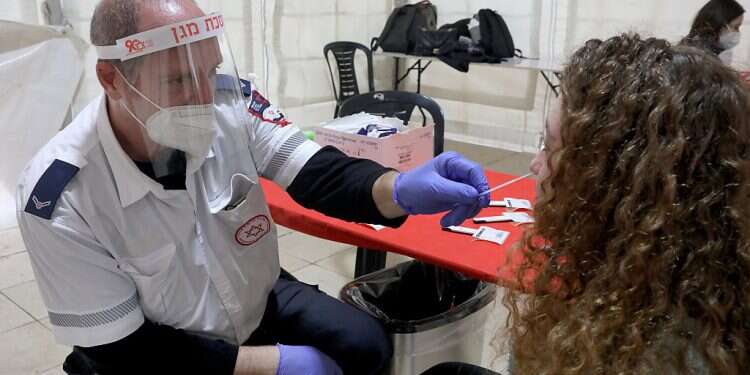The number of confirmed new COVID cases in Israel hit another record on Monday, with 37,847 people testing positive for the virus in a 24-hours period – the most in a single day since the pandemic hit Israel in early 2020, the Health Ministry reported Tuesday.
Follow Israel Hayom on Facebook, Twitter, and Instagram
Of the 359,628 tests processed in the same 24 hours, 11.38% came back positive.
The reproduction rate (R) stood at 2.05 on Tuesday morning, meaning each confirmed carrier infects an average of 2.05 other people.
On Tuesday, there were 185,753 active or symptomatic cases in Israel, with 1,445 people hospitalized for COVID, including 247 in serious condition and 79 in critical condition. A total of 59 hospitalized patients were on ventilators, and 13 were attached to ECMO machines.
Since the start of the pandemic, Israel's death toll stands at 8,271. A total of 367,670 people have received two booster shots, and 4,346,855 people have received both original doses and a single booster.
Hadassah Ein Karem Medical Center reported Tuesday that its two COVID unties were full, and staff were preparing to open a third unit.
Meanwhile, medical staff shortages continue, with 3,743 in quarantine, including 542 doctors and 1,008 nurses.
Although Prime Minister Naftali Bennett expressed pride a few weeks ago in Israel having "bought time" to prepare for the Omicron wave, data presented Monday at an IDF Home Front Command press briefing showed that neither contact tracing nor medical laboratories were provided with additional resources ahead of the fifth wave. However, test processing personnel was doubled, and healthcare authorities inaugurated the use of a "bot" in contact tracing, the Home Front Command reported.
The "bot" traces contacts through the Whatsapp messaging app. It was first used last August, but became operational ahead of the Omicron wave. The Home Front command said that when there are over 3,000 new cases a day, it deploys the bot, and 30-50% of the population on whom the bot is used cooperate with the questioning.
The Omicron variant has caused testing to skyrocket. More than 342,141 PCR and antigen tests were conducted Sunday, according to Health Ministry figures. That's the second highest single-day figure behind a spike of more than 414,000 in late August, as Israel was rolling out its booster shots.
Last week, when the government authorized the use of home testing kits, rapid antigen tests became the most in-demand product for delivery platform Wolt — even more than food, its core business, officials said.
By Monday, as Wolt opened a modern headquarters in a blue building in Tel Aviv, someone was ordering an antigen test every three seconds – a reflection of widespread public anxiety and confusion over the government's constantly changing pandemic policies.
Subscribe to Israel Hayom's daily newsletter and never miss our top stories!
Demand notwithstanding, the government had to issue instructions on Monday about how to use the tests, explaining the people need to swab their throat as well as their nose when using rapid antigen kits to increase the chances of detecting the Omicron variant.
The recommendation goes against the advice of the US Food and Drug Administration (FDA), which has said manufacturers' instructions should still be followed and that incorrect use of throat swabs could pose a safety risk.
Director of Public Health Services in the Health Ministry Dr. Sharon Elroi-Preiss said in an interview on Army Radio that antigen – or lateral flow – tests, used widely in the country, were less sensitive than PCR tests in detecting illness.
"In order to increase their sensitivity we will from now on recommend swabbing the throat and the nose. It's not what the manufacturer instructs but we are instructing this," she said.
The ministry later issued guidelines which said a swab should be taken from the throat and then from one nostril.
"It has the potential to improve the reliability of the test," coronavirus response chief Professor Salman Zarka told a news conference, adding that the ministry would release a video showing how to use the new method.
Zarka said the ministry had spoken with companies supplying the test kits before issuing the new recommendation.
Rhenium, one of the Israeli importers of antigen kits, said earlier the Health Ministry had not consulted with it before issuing the new guidelines and that the tests, not checked by the company for throat swabs, were intended for nasal swabs.




